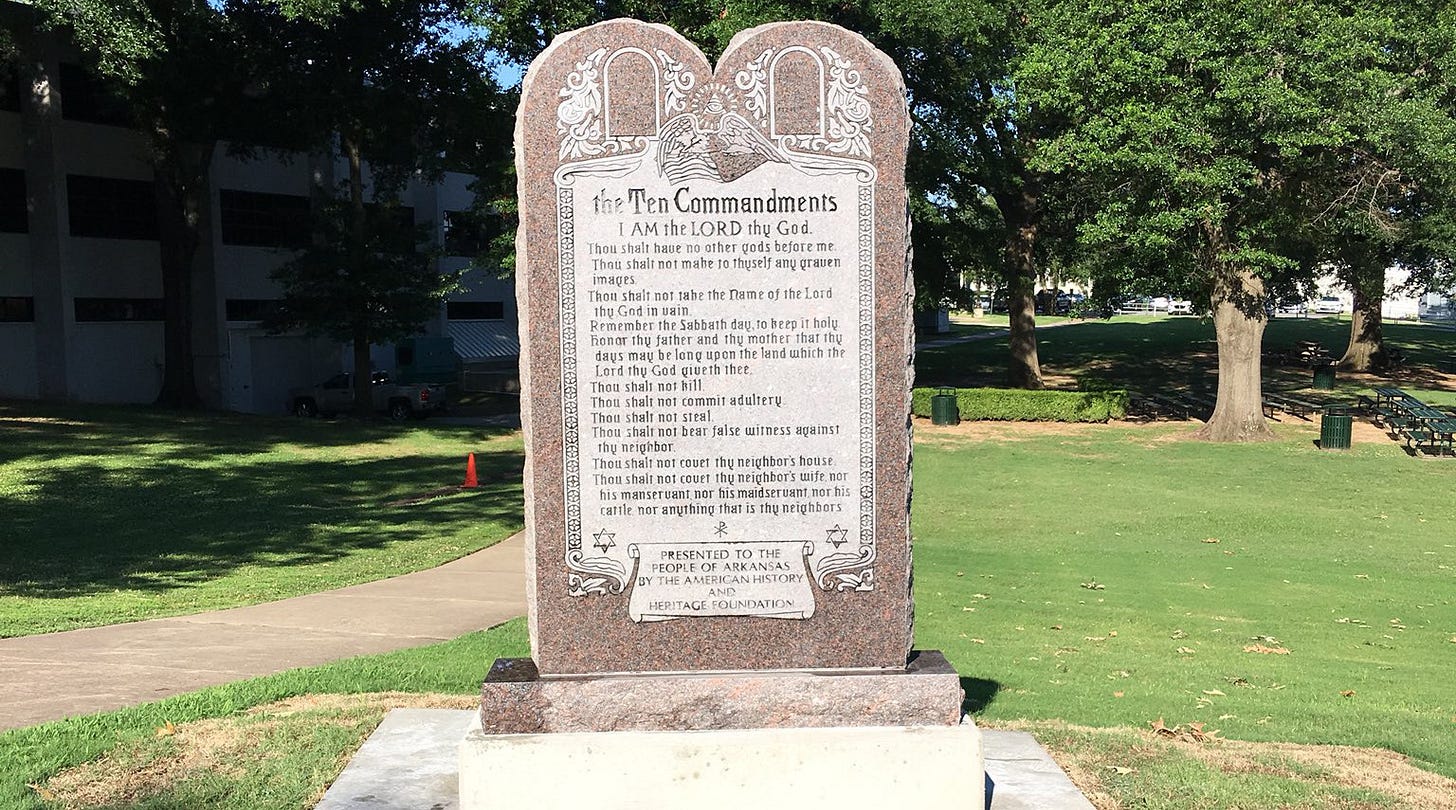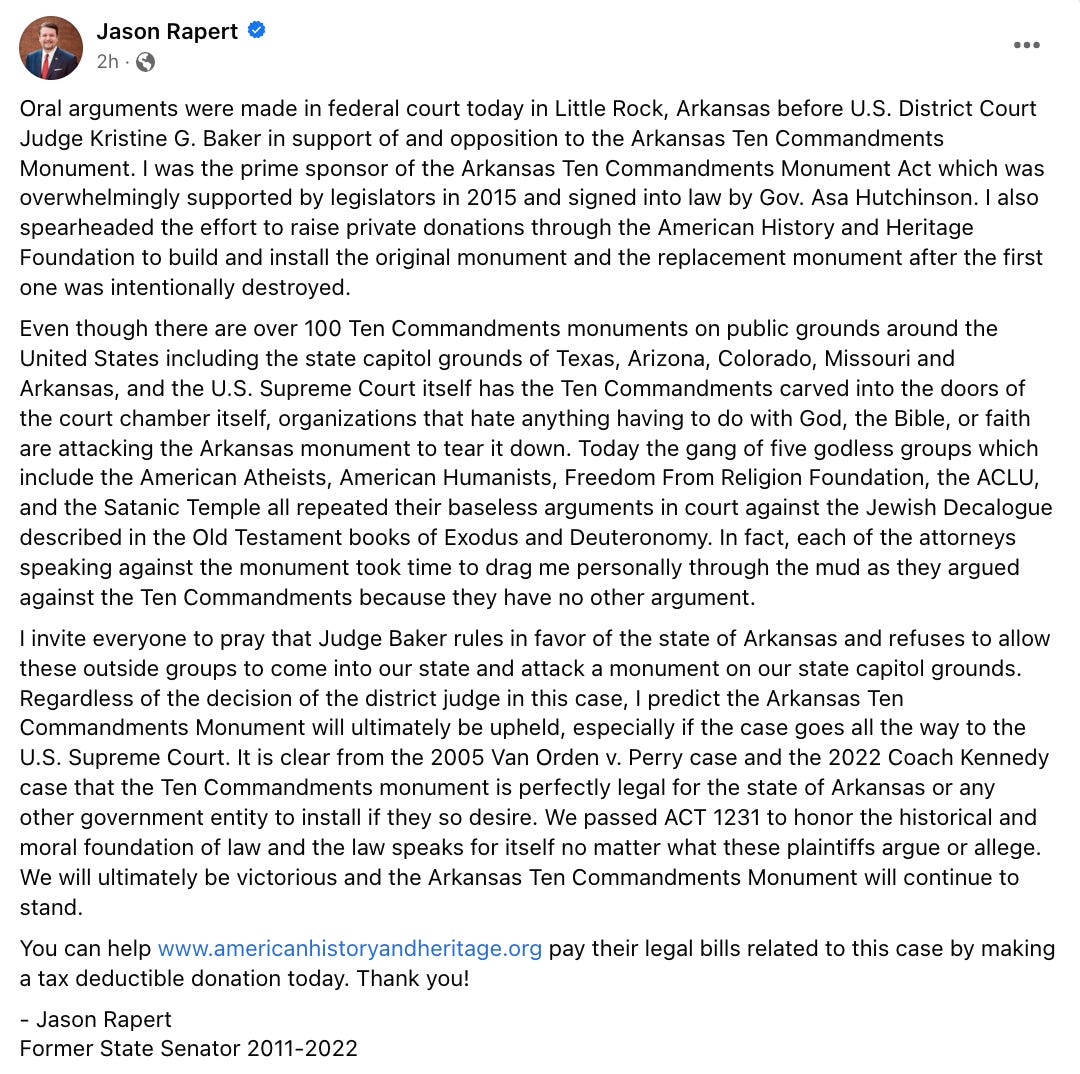Will the Ten Commandments monument outside the Arkansas Capitol finally come down?
Friday's hearing in front of a federal judge could determine the fate of the Christian monument
This newsletter is free, but it’s only able to sustain itself due to the support I receive from a small percentage of regular readers. Would you please consider becoming one of those supporters? You can use the button below to subscribe to Substack or use my usual Patreon page!
Yesterday, a group of atheists and Satanists argued in front of a federal judge, calling for the removal of a Ten Commandments monument outside the Arkansas State Capitol. It’s the latest development in a case that’s been dragging on for several years.
Some background for those who have forgotten about this saga: In 2015, Arkansas passed a law allowing the state to erect a Ten Commandments monument outside the Capitol. It would be privately funded but the same privilege didn’t extend to any non-Christian groups. This was the work of Christian Nationalist lawmaker State Sen. Jason Rapert, who wrote the bill making this a reality.
A number of non-Christian groups—including Satanists, Hindus, and atheists—also wanted to put up monuments representing their beliefs, but state officials always found reasons to reject their requests.
The possibility that a non-Christian group might occupy that space, however, grew strong enough that, in 2017, lawmakers passed another bill giving themselves (and not the Capitol Arts and Grounds Commission) the power to veto additional monuments.
Eventually, though, the Christian monument (and only the Christian one) went up in July of 2017.

And then literally one day later, the monument was destroyed by a Christian vandal.
In April of 2018, a replacement monument went up. Once it was officially on the Capitol grounds, that’s when the lawsuits began.

One of the lawsuits was filed by a coalition of non-theistic groups, including the Freedom From Religion Foundation, the American Humanist Association, the Arkansas Society of Freethinkers, and seven individuals (both religious and nonreligious) who lived in the state.
The other lawsuit was filed by the ACLU of Arkansas on behalf of four atheist and agnostic women.
Those cases were quickly consolidated by U.S. District Judge Kristine Baker.
As those cases were being considered, it was unusual that neither of them involved The Satanic Temple, since that group really fueled the controversy. They had applied to put up their own statue of Baphomet via the same process used to approve the Christian display… but they were rejected.
That July, they filed a motion to act as “intervenors” in this legal battle. In short, that meant they were asking the courts to let them join in the litigation because they would directly be affected by how a judge ruled on this matter in the other lawsuits. It was a way to piggyback on the other cases. The judge approved that motion.
And then the pandemic happened and the trial got postponed. But yesterday all sides were in court pleading their case in front of Judge Baker.
FFRF argued that the Christian monument violated the Constitution:
The Ten Commandments are undeniably religious in nature, FFRF’s brief notes, and its placement has created precisely the kind of religious divisiveness the Establishment Clause was intended to prevent. The religious message “is an archetypical violation of the First Amendment’s Establishment Clause,” charges FFRF’s brief. The use of our secular government for the advancement of one religion’s beliefs above all others is, to put it plainly, un-American.
“Of course, there’s no reference to the bible or God, much less to the Ten Commandments, in our secular Constitution, which is the foundational document that governs our nation,” says FFRF Co-President Dan Barker. “The First Commandment alone — dictating which deity alone must be worshiped — is in clear and direct contravention of our First Amendment.”
The ACLU made the point that Arkansas officials falsely claimed the monument was “historical” because it was the 10 Commandments, when the Supreme Court has used “historical” to mean a Christian monument can stay up on government property because it’s been there for a really long time.
They also noted that Rapert made it very clear that his goal was to shove God into government—and his intentions as a public official mattered. (Rapert later claimed these comments from the lawyers were intended to “drag me personally through the mud.” That’s a lie. They were just quoting him verbatim.)
The Satanic Temple’s argument took a different approach. Their lawyers said the Satanists were denied equal access because of their faith. This was religious discrimination, in other words. It wasn’t just Rapert who was guilty of it either.
The Satanists say they either want their monument to go up in the same place as the Ten Commandments monument—and for the same length of time—or that their Baphomet statue should be placed outside the Capitol at a location determined by both parties.
The lawyers representing Arkansas didn’t seem to know what they were doing, according to an account of the proceedings offered by The Satanic Temple.
They argued the plaintiffs didn’t have standing because they weren’t really harmed by the monument, though they were unable to come up with anyone who would have standing. They argued anyone offended by the monument could just ignore it (which is hard to do for anyone who has business at the Capitol and never seems to be an acceptable solution whenever Christians don’t like something).
They also cited the Supreme Court’s Van Orden decision from 2005, which allowed a Ten Commandments monument outside the Texas Capitol to stay up, ignoring the very relevant fact that the Texas monument was one of several illustrating a broadly secular theme. Arkansas’ situation more closely mirrors a different 2005 case, McCreary County, which involved a stand-alone Christian monument; the Supreme Court declared that one illegal.
Ultimately, Arkansas has no case here, and that seemed to be reflected in everything their lawyers said. It was one faulty argument after another.
There are really just two paths forward here:
The state needs to allow non-Christian groups to erect their own donated monuments on Capitol grounds.
The Christian monument needs to come down.
No one’s disputing the facts of the case. The question is how the judge will use precedent to determine the path forward. As the Arkansas Times explained:
Friday’s hearing will determine whether there will be a trial. If the judge grants summary judgment to one of the parties, [attorney Gerry] Schulze expects an appeal will be filed to the Eighth Circuit Court of Appeals regardless of the outcome.
If the Ten Commandments monument is allowed to stay up—by itself—it would send a clear message that Christianity is the official religion of Arkansas. Non-Christians aren’t welcome there. What a disaster that would be.
Jason Rapert might love to see it, but people who actually care about this country’s principles should oppose it wholeheartedly.
Speaking of which, even Rapert didn’t seem to have much confidence in how the hearing went yesterday. He wrote on Facebook last night, “Regardless of the decision of the district judge in this case, I predict the Arkansas Ten Commandments Monument will ultimately be upheld, especially if the case goes all the way to the U.S. Supreme Court.”
He seems to be implying that he’s going to lose at the district level and possibly the appellate level. He’s just hoping he can get this case in front of the right-wing Supreme Court… even though there’s no reason to think this court would go along with his shenanigans since they’re so clearly illegal.




Take down the 10 commandments? Where's a drunk Christian in a car when you need them?
“even though there’s no reason to think this court would go along with his shenanigans since they’re so clearly illegal.”
I don’t know that that’s a given with this court. I expect the majority think they can say it -is- legal.